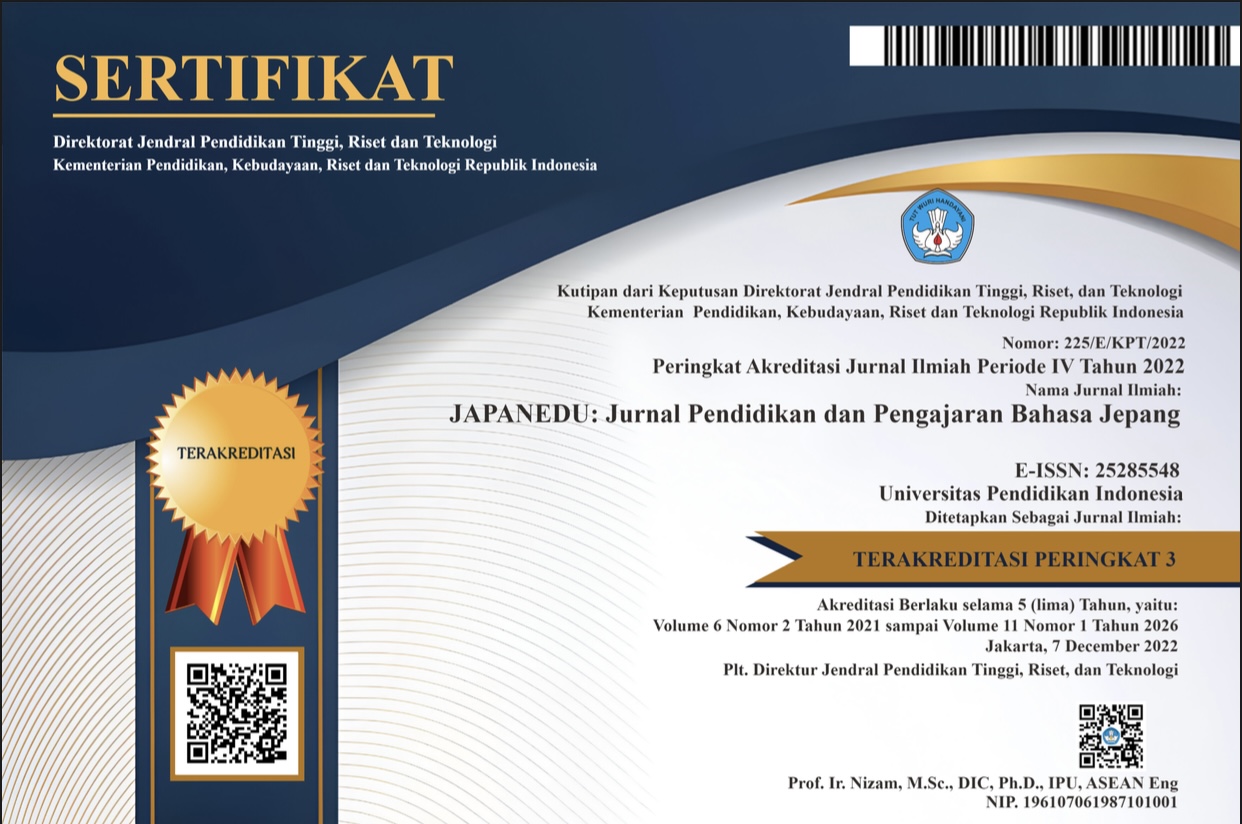The Concept of Japanese Culture in Lean Production of the Toyota Automobile Company: Its Scientific Development and Application in Higher Education and Agriculture
Abstract
Keywords
Full Text:
PDFReferences
Alekseeva, I. Y. (2012). Scientific philosophy as a “cultural system” (About Vladimir Nikolaevich Ivanovsky and his ideas). Questions of Philosophy, 11, pp. 3-10.
Erokhin, E. A. (2008). Influence and expediency of conjugation of lean production. Retrieved from http://www.ekportal.ru/page-id-104.html
Geri, L. (2005). Dao Toyota: 14 prankers, managers, leading companies in the world. Moscow: Alpina Business Books.
Glushchenko, V. V. (1998). Management: system fundamentals (2nd ed.). Zheleznodorozhny, Moscow: LLP NPC “Wings”.
Glushchenko, V. V. (2021). Synthesis of effective ideas of innovative projects during the development of the eighth technological order. International Journal of Engineering Science Technologies, 5(5), 99-118.
Glushchenko, V. V. (2022). Scientific and practical significance of the paradigm of the development of scientific support of the 10th technological order in the world economy. ASEAN Journal of Science and Engineering Education 3(3), pp. 245-264. Retrieved from https://ejournal.upi.edu/index.php/AJSEE/article/view/50465/20122
Glushchenko, V. V., & Glushchenko, I. I. (2009). Improving The Philosophy and Methodology of Science, Management and Prognostics: The Paradigm of Intelligent Management. Moscow: Glushchenko Valery Vladimirovich.
Glushchenko, V. V., & Glushchenko, I. I. (2015). Innovation system: Development strategy. Strategy of Russia, 4, pp.61-76.
Glushchenko, V. V., & Glushchenko, I. I. (2016). Culture of entrepreneurship as a factor of socio-economic development management. Bulletin of Science and practice, 8(9), pp.137-147. Retrieved from http://www.bulletennauki.com/gluschtnko.
Glushchenko, V. V., & Glushchenko, I. I. (2017a). Conceptual aspects of lean production of goods and services. Competence, 6(147). pp. 43-49.
Glushchenko, V. V., & Glushchenko, I. I. (2017b). The mechanism of strategic management of the development of lean higher agricultural education. Aeconomics: economics and agriculture, 1(13). Retrieved from http://aeconomy.ru/наука/экономика/механизм-стратегического-управления /
Glushchenko, V. V., & Glushchenko, I. I. (2017c). Philosophical and methodological aspects of lean production of goods and services. Youth scientific Bulletin, 3(15), pp. 43-49. Retrieved from: http://www.mnvnauka.ru/2017/03/Glushchenko.pdf
Glushchenko, V. V., & Glushchenko, I. I. (2017d). The general theory of lean production of goods and services in agriculture. Aeconomics: economics and agriculture, 3(15).
Ikonnikova, O. V. (2012). “Lean production” in an agricultural organization: utopia or a guide to action. Creative Economy, 1, pp. 62-66.
Glushchenko, V. V., Presnukhina, I. A., & Samodelova, E. V. (2021). Improving the quality of services in the field of higher professional education by applying the theory of lean production at universities. International Journal of Engineering Sciences and Technologies, 5(1), 18-29. https://doi.org/10.29121/ijoest.v5.i1.2021.151 https://www.granthaalayahpublication.org/ojs-sys/index.php/ijoest/article/view/151
James, V., & Daniel, D. (2013). Lean manufacturing. How to Get Rid of Losses and Achieve Prosperity of Your Company. Moscow: Alpina Publisher.
Kirpichkina, M. A., & Novokreschenova, O. V. (2022). Application of lean production methods in practice. The World of science without borders. pp. 578-580.
Knyshova, E. N. (2009). Marketing. Moscow: Publishing house “FORUM”:INFRA-M.
Kohanovsky, V. P. (1999). Philosophy and Methodology of Science: Textbook for Universities. Rostov on Don: Fenix.
Kramer, E. V., & Scriabina, O. V. (2020). The concept of “lean production” as a way to increase the efficiency of production. In The Future of science. The 8th International Youth Scientific Conference: in 5 volumes, pp. 186-188.
Kuznetsov, A. (2009). Lean thinking. Retrieved from http://www.kadrovik.ru/modules.php?op=modload&name=News&file=article&sid=12
Minina, A. A., & Bugaeva, M. V. (2016). Introduction of lean manufacturing in Toyota. In Science and Business: problems and prospects of development of the host country. The International Scientific and Practical Conference, pp. 148-152.
Pitel, T. S. (2016). Problems and prospects of development of lean technologies in gray form within the framework of a programmable complex. Bulletin of the Orel State University of Agrarian University, 62(5), pp. 23-29.
Sibanov, K. S. Brezhlev production: preliminary stage and extraction systems. Colloquium-journal, 2-6 (26), pp. 41-42.
Vader, M. (2012). Lean Manufacturing Tools. Mini-Guide to The Implementation of Lean Production Techniques. Moscow: Alpina Business Books, p. 125.
Volkova, I. A. (2016). Industry features of the implementation of the system of thrift. Bulletin of the Volgograd Institute of Business, 3(36). pp. 21-25.
Zhilyakova, P. A. (2015). Lean production as part of an innovative strategy for the development of agricultural enterprises. Youth and science, 2, p. 22.
DOI: https://doi.org/10.17509/japanedu.v8i2.63168
Refbacks
- There are currently no refbacks.
Copyright (c) 2023 JAPANEDU: Jurnal Pendidikan dan Pengajaran Bahasa Jepang

This work is licensed under a Creative Commons Attribution-ShareAlike 4.0 International License.
 Published by:
Published by: Department of Japanese Language Education, Faculty of Language and Literature Education
Universitas Pendidikan Indonesia
 Online ISSN: Online ISSN:2528-5548 |

JAPANEDU: Jurnal Pendidikan dan Pengajaran Bahasa Jepang (e-ISSN:2528-5548) lisenced under a Creative Commons Attribution-ShareAlike 4.0 Internasional (CC BY-SA 4.0)


